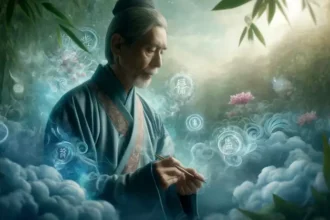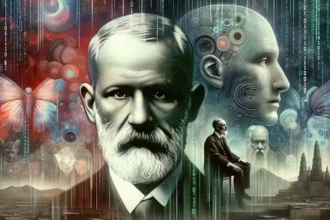Dreaming of a ghost can be quite the spooky experience! Ghosts often symbolize unresolved issues or feelings from your past. They might represent memories that haunt you or emotions that need to be addressed. In dreams, these apparitions can serve as a reminder to confront what you’ve been avoiding.
Sometimes, a ghost in your dream can reflect your own fears and anxieties. It’s like your mind’s way of saying, “Hey, remember that thing you didn’t deal with?” It’s important to pay attention to these dreams because they might hold clues about your emotional state.
Ghosts can also symbolize change or transformation. Just as ghosts are often seen as remnants of the past, they can represent the need to let go of old habits or relationships that no longer serve you. Embracing these changes can lead to personal growth and a brighter future.
Ghost’s Dreams Examples
- Seeing a ghost of a loved one might indicate unresolved feelings or a desire for closure. It’s your mind’s way of helping you process grief or nostalgia.
- Encountering a ghost in a familiar place can symbolize feelings of being trapped in past memories. This dream could suggest it’s time to move on and create new experiences.
- Dreaming of being chased by a ghost may reflect your fears or anxieties catching up with you. It’s a sign to confront these feelings rather than run away.
- Having a friendly ghost in your dream can symbolize acceptance of your past. It may indicate that you’re ready to embrace who you are and let go of guilt.
Dream Meaning: Good or Bad?
When it comes to dreaming of ghosts, the meaning can swing both ways. On one hand, they can represent unresolved issues that need your attention. On the other hand, they might symbolize transformation and the opportunity to release the past. It all depends on the context of the dream and your feelings during it.
If the ghost feels threatening, it could indicate fear or anxiety. But if the ghost feels familiar or comforting, it might suggest acceptance and healing. Understanding your emotions in the dream can help clarify whether it’s a good or bad sign.
Positive Interpretation
Dreaming of a ghost can lead to positive interpretations when it prompts you to reflect on your past in a constructive way. It might encourage you to confront unresolved emotions, allowing you to heal and grow. This can lead to personal transformation, helping you to release burdens that have held you back. Embracing these changes can bring a fresh perspective on life.
Additionally, a friendly ghost in your dream could signify guidance from your past. It may represent the wisdom you’ve gained through experiences, reminding you of lessons learned. This can be a comforting presence that encourages you to move forward with confidence.
Ultimately, a ghost can serve as a catalyst for positive change, urging you to let go of what no longer serves you. By addressing these feelings, you can pave the way for new beginnings and a brighter future.
Negative Interpretation
On the flip side, dreaming of a ghost can also carry negative connotations. If the ghost feels menacing or is chasing you, it may symbolize unresolved fears or trauma. This can indicate that you’re avoiding dealing with certain emotions, which could lead to greater anxiety in your waking life.
A ghost that appears in a dream might also reflect feelings of guilt or regret. It can serve as a reminder of past mistakes or decisions that continue to haunt you. This negative energy can weigh heavily on your mind, making it essential to confront these feelings to find peace.
Moreover, if the ghost represents someone who has passed away, it may symbolize unresolved grief. This can lead to feelings of sadness and longing, reminding you of what you’ve lost. Addressing these emotions is crucial for healing and moving forward.
Different Cultures, Different Meanings
In Ancient Greece, ghosts were often seen as souls stuck between worlds, unable to find peace. They believed these spirits could offer warnings or advice to the living.
Hinduism views ghosts, or “preta,” as spirits of those who have not received proper funeral rites. These spirits are thought to wander until they are honored, emphasizing the importance of rituals.
In Christianity, ghosts are often associated with the souls of the deceased. They can symbolize a call to repentance or a reminder of the afterlife, prompting reflection on one’s actions.
Native American traditions often see ghosts as guides. They believe that spirits can offer wisdom and protection to the living, serving as a connection to ancestors.
Chinese culture has a rich belief in ghosts, viewing them as spirits that can influence the living. Festivals like the Hungry Ghost Festival honor these spirits, ensuring they are appeased.
In Islamic interpretations, ghosts are often linked to jinn. These supernatural beings can impact human lives, and dreams involving them may indicate spiritual messages or warnings.
African folklore often features ancestral spirits as guides. Dreams of these spirits can symbolize a connection to heritage and the importance of honoring one’s roots.
Finally, in modern Western culture, ghosts often represent unresolved issues or emotions. They serve as reminders to confront past experiences and seek closure.
Psychological Perspectives
From a Freudian perspective, dreaming of a ghost may represent repressed memories or desires. Freud believed that dreams serve as a window into our subconscious, revealing unresolved conflicts that need attention. A ghost could symbolize aspects of yourself that you’ve buried but need to confront for personal growth.
Alternatively, Jungian psychology views ghosts as archetypes of transformation. Carl Jung believed that dreams reflect our collective unconscious, and ghosts can symbolize the parts of ourselves that are undergoing change. This perspective encourages embracing these symbols as opportunities for self-discovery and healing.
What You Should Do
If you dream of a ghost, take a moment to reflect on your feelings during the dream. Consider what unresolved issues may be surfacing and how you can address them in your waking life. Writing down your thoughts can help clarify your emotions and provide insight into your situation.
Next, don’t shy away from seeking closure. Whether it’s a conversation with someone from your past or simply acknowledging your feelings, taking action can help you move forward. Remember, it’s okay to seek support from friends or professionals if you need guidance.
Consider using this dream as a catalyst for personal growth. Embrace the changes that come with confronting your past, and use this opportunity to let go of what no longer serves you.
Finally, practice mindfulness and self-compassion. Acknowledge your feelings without judgment, allowing yourself to heal. This can create a positive shift in your emotional well-being, leading to a brighter future.



























